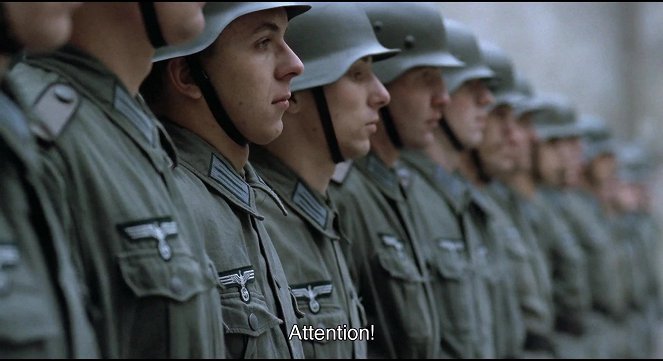Director:
Joseph VilsmaierMúsica:
Enjott SchneiderReparto:
Dominique Horwitz, Thomas Kretschmann, Jochen Nickel, Sebastian Rudolph, Martin Benrath, Sylvester Groth, Heinz Emigholz, Karel Heřmánek, Dieter Okras (más)Streaming (1)
Sinopsis(1)
Stalingrado sufre un terrible asedio por parte de las tropas alemanas. Película coral en la que se muestran los horrores de la guerra a través de las vicisitudes de un grupo de soldados alemanes que llegan a Stalingrado tras disfrutar de un permiso en Italia. La batalla de Stalingrado fue, sin duda, una de las más sangrientas de la Segunda Guerra Mundial (1939-1945). En ella murieron más de un millón y medio de soldados. Una superproducción alemana de esmerada ambientación. (Araba Films)
(más)Reseñas (4)
A very disillusioning sight of the Battle of Stalingrad through the eyes of those who lost it. There's no room for heroism, no room for ideals and faith in the Empire. All that matters is survival. But that's more of a fiction in Stalingrad. The fact that not only heroic Red Army men suffered on the Volga, but mainly German troops in the final stages of the battle, is captured here with all openness and relentlessness, but there is no unnecessary heroism. On the contrary. In a battle in which tens of thousands of men were sacrificed, the paradox of war was most manifested – those who lead them suffer the least, only innocent figurines die on chessboards. That's exactly what Stalingrad captured perfectly. It’s better than ten Saving Private Ryan’s in terms of content, but unfortunately, technically it’s "just a German film". And you can see that – especially in the first third, when the mass scenes do not give a convincing and breathtaking impression. But once the focus really is on the desperate crowd of "living dead" soldiers, Vilsmaier's film is one of the best the war genre has to offer.
()
Despite being a relatively famous film and at the same time a German perspective on the Eastern Front of World War II, it has a number of shortcomings. Among other things, you can see its limited budget, as there are no grand and generously shot battle scenes. Even the tank battle is small with a group of actors leading it. Although the film does not have Soviet pathos and is not full of ideology, it is evident that the German side is trying to smooth over its past and retouch it in several details. It is amusing when a German officer tells his subordinates that he is not a Nazi, right in the middle of his staff, or when a German soldier expresses surprise in front of a group of officers about the mistreatment of Soviet prisoners of war. Of course, many soldiers disagreed with that, but it was a common practice and was as chronically known as the solution to the Jewish question. The film has a peculiar structure, where it is difficult to imagine, based on the events on the screen, how the battle actually took place and map out all its phases. The clash in the film takes the form of a series of episodic conflicts, where the individual is mostly lost. Some scenes seem rather crazy, like that officer's storeroom stuffed with provisions amid soldiers starving to death, which the characters of the film find abandoned, it is truly unbelievable. Just like that strange final escape from relative safety into no man's land. Overall impression: 55%.
()
A literally chilling (anti-)war film that is so good that it could easily have been subtitled "A Submarine Without a Submarine". The excellent Karel Heřmánek steals most of it for himself, as he unforgettably and easily outshines all the other actors, but that doesn't mean that Thomas Kretschmann or Dominique Horowitz are bad. Not at all. Five stars.
()
Stalingrad is a compellingly shot war drama that manages to do a lot with little. The film lacks spectacular epic war scenes, focusing more on tunnel warfare, featuring only a single T-34 instead of tons of heavy war machinery, which makes the film all the more impressive. It doesn't portray the Battle of Stalingrad as a gigantic encirclement operation, but describes the fight for the city through the eyes of individual people, giving the story a human dimension that certainly adds to the whole experience. Anyway, it's a refreshing departure from the standard big-budget war films. Plus it's interesting that Karel Heřmánek was cast as a Wehrmacht Hauptmann when he usually plays a Hebrew hunting deer. But it definitely wasn’t a bad move.
()

